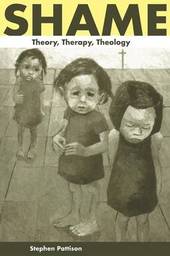
|
Shame: Theory, Therapy, Theology
Paperback / softback
Main Details
| Title |
Shame: Theory, Therapy, Theology
|
| Authors and Contributors |
By (author) Stephen Pattison
|
| Physical Properties |
| Format:Paperback / softback | | Pages:356 | | Dimensions(mm): Height 229,Width 152 |
|
| Category/Genre | Christian theology |
|---|
| ISBN/Barcode |
9780521568630
|
| Classifications | Dewey:152.4 |
|---|
| Audience | | General | | Professional & Vocational | |
|---|
| Illustrations |
1 Halftones, unspecified
|
|
Publishing Details |
| Publisher |
Cambridge University Press
|
| Imprint |
Cambridge University Press
|
| Publication Date |
5 October 2000 |
| Publication Country |
United Kingdom
|
Description
This interdisciplinary study brings together many contemporary discourses about shame within a new critical perspective. It will be an invaluable, stimulating resource for all those who are concerned with understanding shame and assisting those whose lives are lived in the shadow of it. Psychologists, philosophers and therapists will find this a fascinating source of new insight into the theory and phenomenology of shame. It will be of particular interest to those who are interested in relationships between religion and mental health, to pastoral workers, and to religious thinkers and theorists.
Author Biography
Stephen Pattison is Professor of Religion, Ethics, and Practice and H. G. Wood Professor of Theology at the University of Birmingham. His latest books are The Challenge of Practical Theology (2007), Seeing Things: Deepening Relations with Visual Artefacts (2007) and Saving Face: Enfacement, Shame, Theology (2013).
Reviews'Thoughtful observers of the human condition have largely shifted from an earlier concern with behavior toward rapt concentration on the emotions that underlie or accompany it. The very concept of morality forces attention on shame and guilt as the internal enforcers of any moral code. Professor Pattison, whose career long interest in the doing of religious work has made any of his books worth serious attention, here presents a compelling argument that theology must be practical in order to accomplish its goals. In this stunning text, he heralds a shift from a Christian doctrine based on the shaming attribution of the worshiper as inherently defective toward one grounded in compassion, safety, and love. This is a must read for anyone who cares about the future of religious practise.' Donald L. Nathanson, M.D., Clinical Professor of Psychiatry, The Silvan S. Tomkins Institute, Philadelphia 'There are a lot of books which address critically issues of contemporary Christianity and theology. This one, however, arises from the inside, does not hide the author's deep scars, produces detailed and accessible evidence, is extremely well-informed, and demonstrates the urgency of looking at the shame-generating potential and reality of Christianity. Pattison makes the topic accessible to a wider public: the interested, though not necessarily theologically educated, reader will gain a fascinating and clear overview of some of the fundamental questions Christianity is currently struggling with. One of the great merits of his brilliant study is the 'import', as it were, of a wide body of 'outside knowledge' into theological thinking. The book takes us deeper into our realities and helps us to face them.' Werner Ustorf, University of Birmingham 'This is a must read for anyone who cares about the future of religious practise.' Donals L. Nathanson, M. D., Clinical Professor of Psychiatry, The Silvan S. Tomkins Institute, Philadelphia 'The range of questions that this book stimulates is an indication of its quality and importance.' Theology 'Pattison has written an important book whose content has been forged in the fire of his own experience. It should be required reading by pastors and others who have the well-being of the people in their congregations at heart.' Sue and Philip Clements-Jewery 'This book offers a new and deeper insight into the experience of shame ... the author has succeeded in producing a book on the subject of shame that is both scientific as well as profoundly moving.' South African Journal of Psychology
|